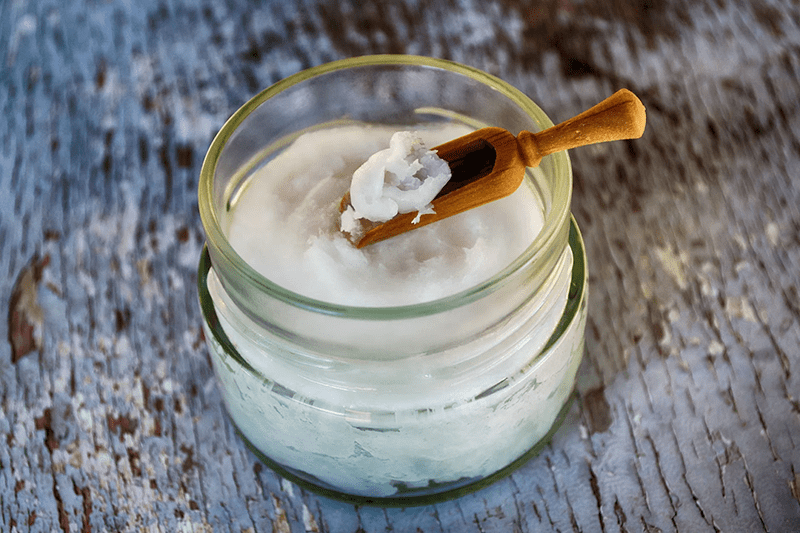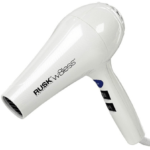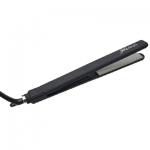
If you’re reading this with hopes of finding an answer to your dry scalp dilemma, I’m here to tell you – it gets better! A number of different factors can cause dry scalp. For me, it was not drinking enough water and washing my hair too often. For you, the culprit may be a different cause.
Nonetheless, I’m here to share 4 natural ways on how to moisturize your scalp and say goodbye to that persistent itchiness caused by a dry scalp.
1. Coconut Oil
I’ll always be a big fan of coconut oil because of its several skin and hair benefits. Putting coconut oil in your hair will not only moisturize your dry scalp but will also leave your hair super smooth. For best results, use coconut oil in your hair 2-3 times a week.
To use, simply follow these steps:
- Apply a tablespoon of coconut oil directly to your scalp.
- Massage it into the skin.
- Leave for 10 minutes.
- Wash your hair as you normally would.
Note: If you find you’ve used too much coconut oil, check out this guide on getting coconut oil out of hair.
2. Tea Tree Oil
Next on my list is tea tree oil because of its antiseptic and antifungal properties. This product helps relieve dry scalp, and when I use it, it relieves the itchiness on my scalp almost immediately.
You may not be able to find tea tree oil as easily as coconut oil, but it’s still fairly common. You can purchase this as an essential oil from several drugstores or order it online. You could also find a shampoo that contains tea tree oil as an active ingredient, but the only issue I have with this is that sometimes dry scalp is a result of switching up your hair care routine.
To use tea tree oil, follow these steps:
- Mix a few drops of oil with a carrier oil. This can be olive oil or coconut.
- Massage the mixture onto your scalp.
- Leave in hair for 10 minutes.
- Wash hair like you normally would.
3. Aloe Vera
You’ve probably used aloe vera once or twice before to help with a sunburn. This is because it has many properties that help with dry scalp. Its anti-inflammatory properties reduce skin irritation and it will also work wonders on your skin.
Hydrate your scalp using aloe vera by applying it directly to your scalp and letting it sit for about 10 minutes. Next, wash it out like you normally would. It’s that easy!
4. Apple Cider Vinegar
The final product I want to shed light on is apple cider vinegar, mainly because you probably already have some in your kitchen pantry. However, ACV is also a scalp moisturizer worth trying. This is another antimicrobial product that reduces the symptoms of a dry scalp. It is also anti-inflammatory which helps exfoliate your scalp.
To use, follow these steps:
- Mix 1-3 tablespoons of apple cider vinegar with warm water.
- Shampoo your hair, and then pour the vinegar mixture over your head.
- Using your fingers, massage it into the scalp.
- Let it sit for a few minutes, and then rinse.
Finding the Root Cause of Your Dry Scalp
Sometimes, these natural remedies won’t help moisturize the skin because the dryness is coming from a different cause. Oftentimes, it can be a matter of not drinking enough water, an allergic reaction to the shampoo you’re currently using, or using too much of a product.
A good rule of thumb is to make small changes to your hair care routine. Therefore, if something improves or worsens, you know which change caused this. I suggest you pick one of the 4 natural remedies above and try it for about 2 weeks.
If you try 2-3 of the remedies and nothing works, your scalp’s dryness may be coming from an underlying condition like psoriasis or eczema. If this is the case, your medical provider will be able to prescribe some alternatives.
Bottom Line
A dry scalp is uncomfortable, but fortunately it is very treatable. Whether the cause of your itchiness is coming from a change in your hair routine or washing your locks much too often, the above home remedies can help speed up the process to a healthier scalp. If you don’t notice any difference in your scalp after two weeks, I encourage you to see a doctor.


